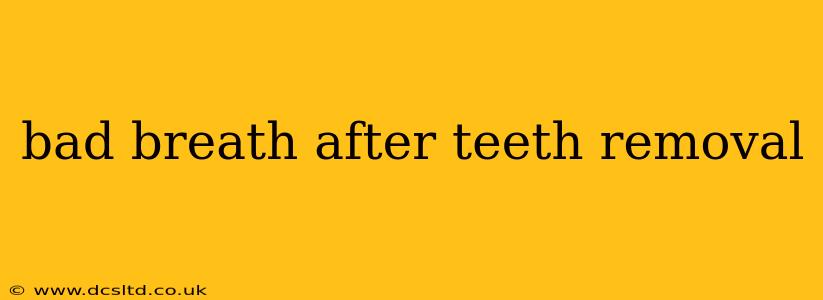Bad breath, or halitosis, is a common concern after tooth extraction. While it's often temporary, understanding its causes and how to manage it can significantly improve your post-operative comfort and accelerate healing. This comprehensive guide explores the reasons behind post-extraction halitosis and provides effective solutions to help you regain fresh breath.
What Causes Bad Breath After Tooth Extraction?
Several factors contribute to bad breath following tooth removal. The primary culprits are:
- Blood Clots: The formation of a blood clot in the extraction socket is crucial for healing. However, decomposing blood, if the clot is disrupted, can emit an unpleasant odor.
- Food Debris: The extraction site is susceptible to trapping food particles, especially in the initial days after surgery. These particles can decay and cause bad breath.
- Infection: A bacterial infection in the extraction socket is a serious complication that can lead to significant bad breath, along with other symptoms like pain, swelling, and pus.
- Dry Socket: Also known as alveolar osteitis, dry socket occurs when the blood clot is dislodged from the extraction site, exposing the bone and nerve endings. This is extremely painful and often accompanied by a foul odor.
- Poor Oral Hygiene: Neglecting proper oral hygiene practices, particularly after surgery, can exacerbate the issue and lead to a build-up of bacteria.
How Long Does Bad Breath Last After Tooth Extraction?
The duration of bad breath varies depending on the individual, the complexity of the extraction, and the presence of any complications. In most cases, mild bad breath should subside within a few days as the healing process progresses. However, if it persists for more than a week or is accompanied by other symptoms, it’s crucial to contact your dentist or oral surgeon immediately.
How to Get Rid of Bad Breath After Tooth Extraction?
Addressing bad breath after a tooth extraction involves a combination of preventative measures and proactive solutions:
- Gentle Rinsing: Rinse your mouth gently with a saltwater solution (1/2 teaspoon of salt in 8 ounces of warm water) several times a day. This helps to clean the extraction site and prevent infection. Avoid vigorous rinsing or spitting, which can dislodge the blood clot.
- Maintaining Oral Hygiene: Brush your teeth gently, avoiding the extraction site, and floss carefully around the other teeth. This helps prevent bacteria build-up in the mouth.
- Proper Diet: Avoid strong-smelling foods and drinks, such as onions, garlic, and alcohol, as these can worsen halitosis.
- Hydration: Staying well-hydrated helps to keep your mouth moist and washes away bacteria.
- Avoid Smoking: Smoking significantly impairs healing and increases the risk of infection, leading to more persistent bad breath.
- Prescription Medications: Your dentist or oral surgeon may prescribe antibiotics or other medications to address infection or manage pain. Follow their instructions carefully.
What if the Bad Breath is Severe or Persistent?
Severe or persistent bad breath after tooth extraction may indicate a complication, such as a dry socket or infection. Seek immediate dental attention if you experience:
- Severe pain: Pain far exceeding what's expected after an extraction.
- Increased swelling: Significant swelling in the jaw or face.
- Pus or foul-smelling discharge: Any sign of infection.
- Persistent bad breath: Bad breath lasting more than a week.
- Fever or chills: These are signs of a systemic infection.
Can Dry Socket Cause Bad Breath?
Yes, dry socket (alveolar osteitis) is a common cause of persistent and foul-smelling bad breath after tooth extraction. The exposed bone in the socket provides a breeding ground for bacteria, resulting in a significant odor. Treatment for dry socket usually involves irrigating the socket and packing it with medicated dressings to promote healing.
Does Bad Breath After Tooth Extraction Mean Infection?
While bad breath can be a symptom of infection, it’s not always indicative of a serious problem. However, persistent bad breath, especially if accompanied by other symptoms like pain, swelling, or fever, should warrant a visit to your dentist or oral surgeon to rule out infection.
Remember, maintaining good oral hygiene and following your dentist’s post-operative instructions are crucial for minimizing the risk of complications and promoting rapid healing. If you have any concerns about bad breath or other symptoms after a tooth extraction, always consult your dental professional. They can provide the best advice and treatment tailored to your specific situation.
